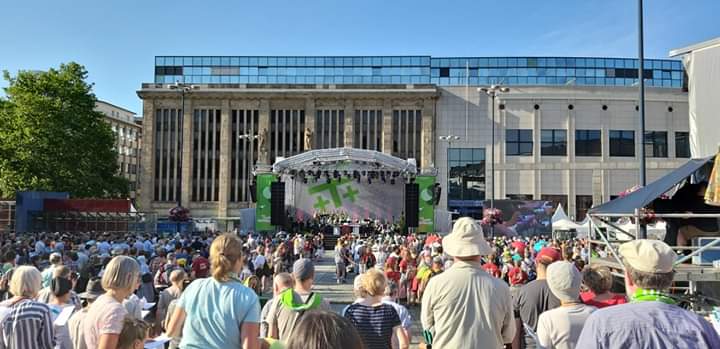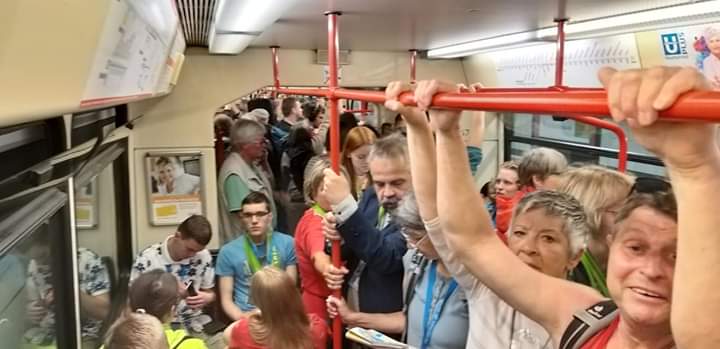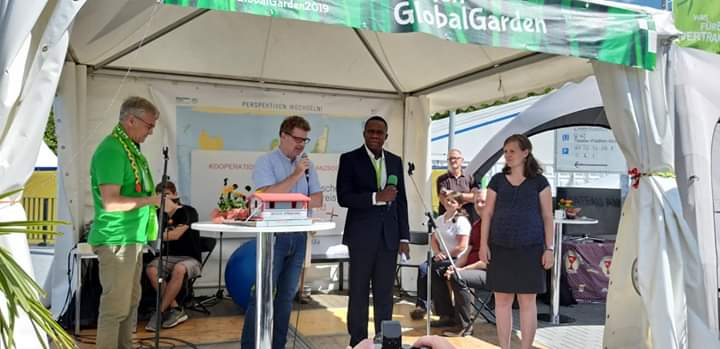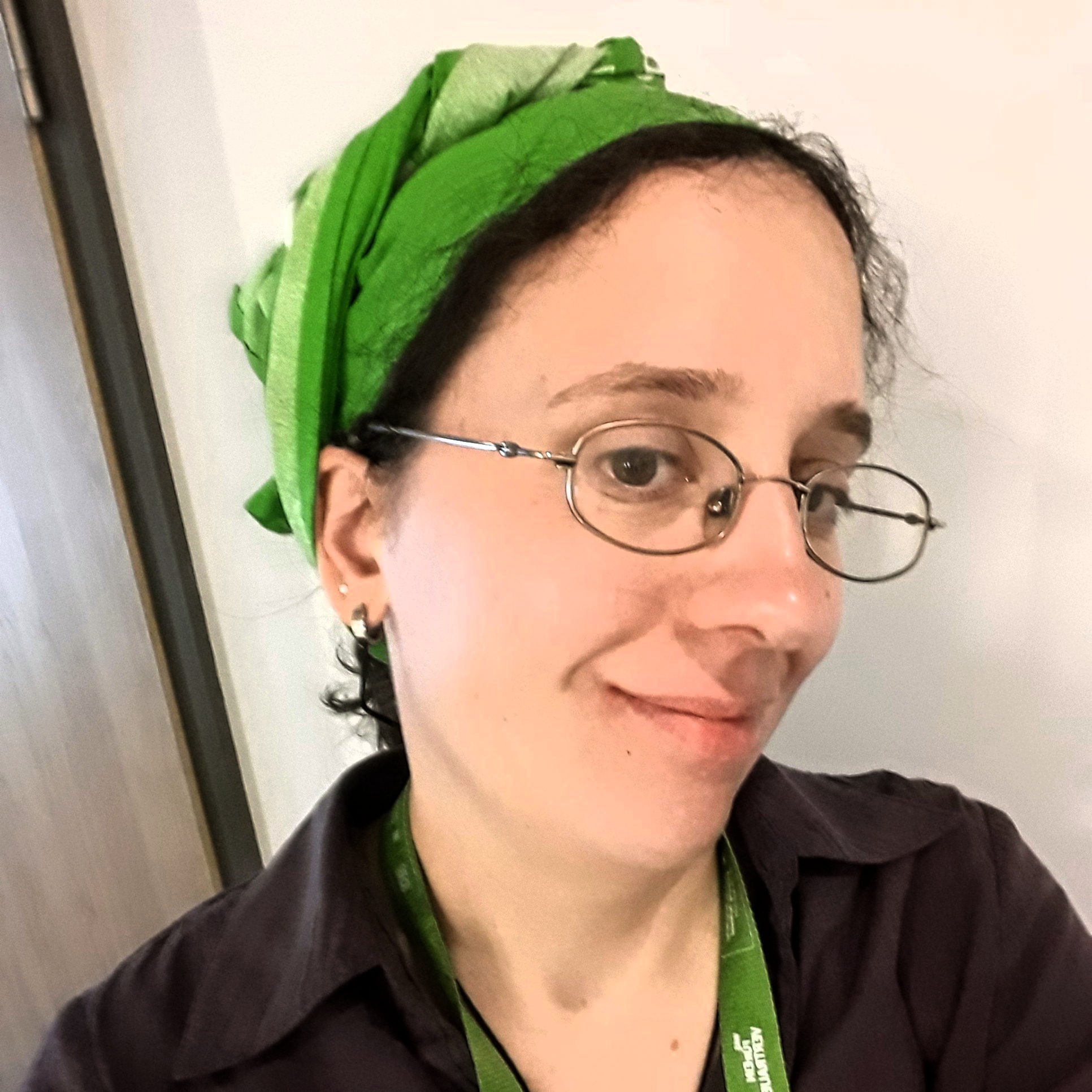Guest Blog by Emily Dervisevic from England.
Emily Dervisevic came to Kirchentag as part of the Salford group. She already knew Dortmund quite well, having spent a year studying at the city’s university as part of her BA German Studies degree. She is a Christian and has a broad ecumenical background as a member of an Anglican Church in Salford, a volunteer for the Salvation Army church and with connections to the Quaker church for many years, including spending a year as an employee at their central offices. She occasionally attends Quaker meeting in the Salford area, which is where she first heard about Kirchentag and was asked if she would like to come along. Since returning from Dortmund, Emily has become a member of the Salford – Lünen Churches Partnership Committee, who are currently preparing for a visit from their Lünen partners in October 2019.
Five things to take away from Kirchentag 2019
Kirchentag is BIG
Kirchentag is much more than simply the gathering of Germany’s Protestant churches. Over five days
more than 100,000 people came to share in faith and activism, with 2,400 different events such as
services, lectures, panel discussions, exhibitions, concerts and musicals taking place in 200 different
locations across the city (not to mention being broadcast live on TV). Indeed, it was hard at first not
to feel totally overwhelmed. This was where attending the international programme came into its
own. Arranged by the Church of Dortmund’s Department of Ecumenism, the programme wrapped
around the five days of the Kirchentag, allowing us to settle in, get to know each other and take part
in workshops. Perhaps the most important session helped us to make sense of the vast programme
by identifying topics of interest and then working in groups to find events that linked to them. I
certainly got so much more out of the Kirchentag from doing this.
It takes over the whole town
This was particularly true for Dortmund – it’s a much smaller town than Berlin, Frankfurt etc., so
during the Kirchentag its population swelled by as much as 20%. I’ve never seen Dortmund’s metro
trains so full (sometimes you couldn’t even board and had to wait for the next one) but with fellow
Kirchentagers all around you, recognizable from their green scarves, there was undoubtedly a certain
magic in the air. I felt this mostly keenly on the journey back from the Westfalenpark after the
evening Taizé service, when the whole train carriage suddenly started singing hymns. It was the most
ethereal experience of the spirit – of the Kirchentag, perhaps even of the Holy Ghost – present
among us.
It’s full of music
Whether it’s brass bands on every corner or a Christian remix of 99 Red Balloons at the closing
ceremony, music is an integral part of the Kirchentag. In the evenings, I went to a musical in German
about Martin Luther King (as surreal as it sounds!), an enchanting Taizé service by the lake of the
Westfalenpark and a gorgeous Anglican Evensong performed in Dortmund’s famous Marienkirche.
However, the absolute highlight were the performances given by choirs and musicians from around
the world before, after, and sometimes in the middle of lectures and panel discussions. This proved
to be the perfect combination, as the beautiful music helped me center down and focus on some
extremely meaty topics. And it’s not every day you get to see a live performance of a Masaai choir!
It’s about social justice
The Kirchentag is a Lay movement with an important political platform in Germany, “established [as]
a faith-based open forum for democracy, human rights, ecumenism and raising awareness against
every kind of discrimination.” Over three days I attended presentations on peaceful civil intervention,
women’s role in peace and social justice, overcoming conflict and trauma and African and European
views on better migration – huge subjects, deftly handled by remarkable panels of experts. I was also
invited to attend the presentation by Dr Bosolo about the Ambulanzboot (ambulance boat), an
incredible project that provides emergency medical care to people in remote villages in the Congo.
However, the Kirchentag’s commitment to social justice was best captured by Sandra Bil’s call to
action during the sermon of the closing ceremony: “If we believe in Jesus’ message, ‘That which you
do to the least of my brothers and sisters, you also do unto me’, then for us saving lives is not a crime
but a Christian duty. We do not let our fellow humans drown – period. ”
It’s about community and building on our experiences together
Once the Kirchentag was over, our international group took part in a feedback workshop where there
was a strong desire amongst everyone to build on our experiences and foster the links we had made.
We have started a Facebook Group, with the view of having a regular newsletter to strengthen our
communication links and perhaps developing further projects with each other. My personal
experiences have inspired me to take an active part in maintaining these links by joining the Salford –
Lünen Churches Partnership Committee, where I am helping with preparations for the visit by our
friends from Lünen this October. Above all, taking part in the Kirchentag showed me that in a world
that often feels so full of uncertainty and fear, having spaces to build strong, positive communities is
more vital than ever. And that there are, quite simply, a lot of pretty nice people in the world.





Hinterlasse einen Kommentar